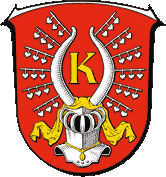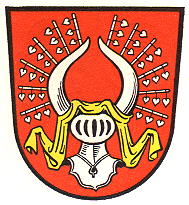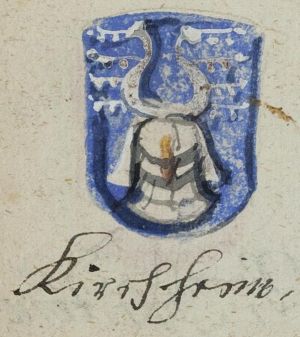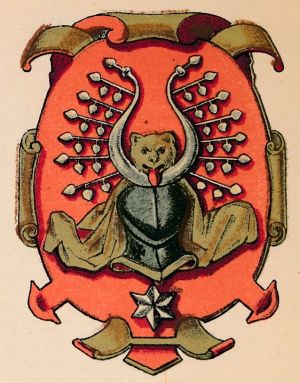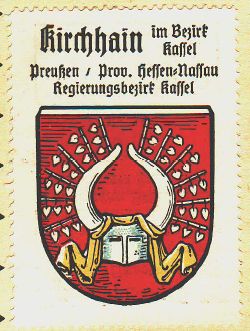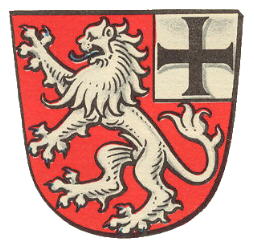Kirchhain (Hessen): Difference between revisions
Knorrepoes (talk | contribs) m (Text replacement - "|center|Wappen von {{PAGENAME}}]] " to "|center|alt=Wappen von {{PAGENAME}} / Arms of {{PAGENAME}}]] ") |
Knorrepoes (talk | contribs) m (Text replacement - " / Arms" to "/Arms") |
||
| Line 7: | Line 7: | ||
Additions : 1971 Anzefahr, Betziesdorf, Burgholz, Himmelsberg, Kleinseelheim, Langenstein, Niederwald, Schönbach, Sindersfeld, Stausebach; 1974 Emsdorf, Großseelheim | Additions : 1971 Anzefahr, Betziesdorf, Burgholz, Himmelsberg, Kleinseelheim, Langenstein, Niederwald, Schönbach, Sindersfeld, Stausebach; 1974 Emsdorf, Großseelheim | ||
[[File:kirchhain.gif|center|alt=Wappen von {{PAGENAME}} / Arms of {{PAGENAME}}]] | [[File:kirchhain.gif|center|alt=Wappen von {{PAGENAME}}/Arms of {{PAGENAME}}]] | ||
{| class="wikitable" | {| class="wikitable" | ||
| Line 25: | Line 25: | ||
The arms show the helmet and crest of the Counts of Hessen. Kirchhain received city rights from the Counts of Hessen between 1344 and 1352. All later seals and images have shown the same composition, sometimes with small additions, such as a letter K, a lion's head or a small cross. The latter probably indicated that the city was a loan of the Teutonic Knights from 1350-1370. | The arms show the helmet and crest of the Counts of Hessen. Kirchhain received city rights from the Counts of Hessen between 1344 and 1352. All later seals and images have shown the same composition, sometimes with small additions, such as a letter K, a lion's head or a small cross. The latter probably indicated that the city was a loan of the Teutonic Knights from 1350-1370. | ||
The lion's head most probably was the lion of Hessen, the letter K obviously the town's initial. In the 18<sup>th</sup> century the small lion's head was erroneoously changed in an ox head. In the early 19<sup>th</sup> century all small additions were removed and until the municipal changes in the 1970s the city used the arms without the letter K as shown below. [[File:kirchhai.jpg|center|alt=Wappen von {{PAGENAME}} / Arms of {{PAGENAME}}]] | The lion's head most probably was the lion of Hessen, the letter K obviously the town's initial. In the 18<sup>th</sup> century the small lion's head was erroneoously changed in an ox head. In the early 19<sup>th</sup> century all small additions were removed and until the municipal changes in the 1970s the city used the arms without the letter K as shown below. [[File:kirchhai.jpg|center|alt=Wappen von {{PAGENAME}}/Arms of {{PAGENAME}}]] | ||
In 1956 new arms were proposed and published in the Hessisches Wappenbuch. These arms show a silver lion in red and a small silver quarter with a black cross. These arms show the oldest form of the lion of Hessen and the cross of the Teutonic Order. This proposal was not adopted by the city and instead in the 1970s the letter K was added. This also avoided confusion with the arms of[[Kirtorf]], which show a similar design. | In 1956 new arms were proposed and published in the Hessisches Wappenbuch. These arms show a silver lion in red and a small silver quarter with a black cross. These arms show the oldest form of the lion of Hessen and the cross of the Teutonic Order. This proposal was not adopted by the city and instead in the 1970s the letter K was added. This also avoided confusion with the arms of[[Kirtorf]], which show a similar design. | ||
Revision as of 11:19, 2 September 2022
This page is part of the German heraldry portal |
Heraldry of the World |
|
German heraldry:
|
Selected collector's items from Germany:
|
KIRCHHAIN
State : Hessen
District (Kreis) : Marburg-Biedenkopf
Additions : 1971 Anzefahr, Betziesdorf, Burgholz, Himmelsberg, Kleinseelheim, Langenstein, Niederwald, Schönbach, Sindersfeld, Stausebach; 1974 Emsdorf, Großseelheim
| German |
In Rot ein silberner Spangenhelm mit goldenen Helmdecken und zwei silbernen Büffelhörnern als Helmzier, die außen mit je sechs silbernen Lindenzweigen besteckt sind, zwischen den Büffelhörnern ein goldenes „K“. |
| English | (Hessen) No blazon/translation known. Please click here to send your (heraldic !) blazon or translation |
Origin/meaning
The arms were officially granted on November 11, 1986.
The arms show the helmet and crest of the Counts of Hessen. Kirchhain received city rights from the Counts of Hessen between 1344 and 1352. All later seals and images have shown the same composition, sometimes with small additions, such as a letter K, a lion's head or a small cross. The latter probably indicated that the city was a loan of the Teutonic Knights from 1350-1370.
The lion's head most probably was the lion of Hessen, the letter K obviously the town's initial. In the 18th century the small lion's head was erroneoously changed in an ox head. In the early 19th century all small additions were removed and until the municipal changes in the 1970s the city used the arms without the letter K as shown below.In 1956 new arms were proposed and published in the Hessisches Wappenbuch. These arms show a silver lion in red and a small silver quarter with a black cross. These arms show the oldest form of the lion of Hessen and the cross of the Teutonic Order. This proposal was not adopted by the city and instead in the 1970s the letter K was added. This also avoided confusion with the arms ofKirtorf, which show a similar design.
| The arms in a 16th century manuscript |
The arms in a manuscript from +/- 1730 |
| The arms in an 1884 book |
The arms by Hupp in the Kaffee Hag albums +/- 1925 |
| The proposal of 1956 |
Contact and Support
Partners:
Your logo here ?
Contact us
© since 1995, Heraldry of the World, Ralf Hartemink 
Index of the site
Literature : Stadler, 1964-1971, 8 volumes. Hessisches Wappenbuch, 1956


